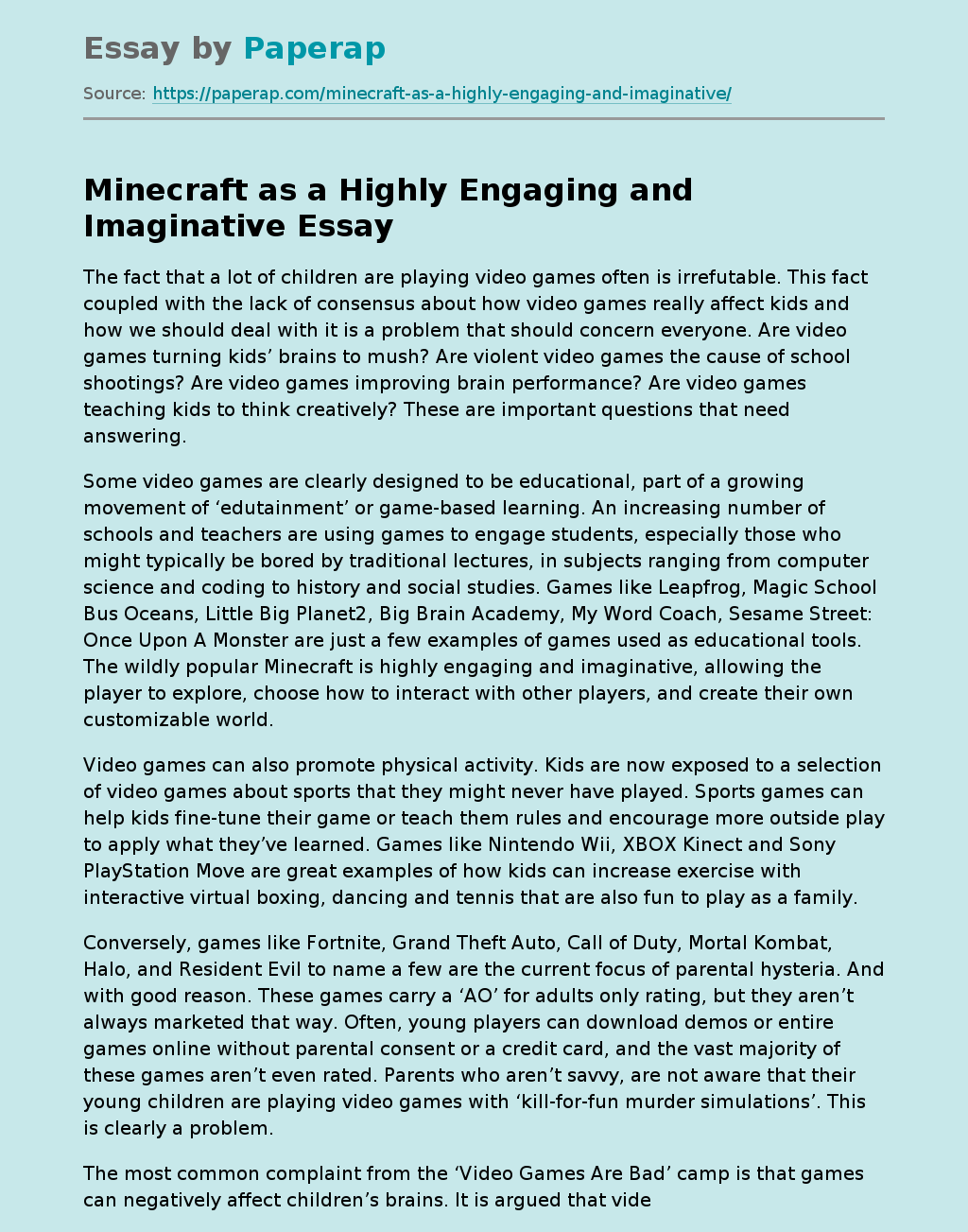Minecraft as a Highly Engaging and Imaginative
The fact that a lot of children are playing video games often is irrefutable. This fact coupled with the lack of consensus about how video games really affect kids and how we should deal with it is a problem that should concern everyone. Are video games turning kids’ brains to mush? Are violent video games the cause of school shootings? Are video games improving brain performance? Are video games teaching kids to think creatively? These are important questions that need answering.
Some video games are clearly designed to be educational, part of a growing movement of ‘edutainment’ or game-based learning. An increasing number of schools and teachers are using games to engage students, especially those who might typically be bored by traditional lectures, in subjects ranging from computer science and coding to history and social studies. Games like Leapfrog, Magic School Bus Oceans, Little Big Planet2, Big Brain Academy, My Word Coach, Sesame Street: Once Upon A Monster are just a few examples of games used as educational tools.
The wildly popular Minecraft is highly engaging and imaginative, allowing the player to explore, choose how to interact with other players, and create their own customizable world.
Video games can also promote physical activity. Kids are now exposed to a selection of video games about sports that they might never have played. Sports games can help kids fine-tune their game or teach them rules and encourage more outside play to apply what they’ve learned. Games like Nintendo Wii, XBOX Kinect and Sony PlayStation Move are great examples of how kids can increase exercise with interactive virtual boxing, dancing and tennis that are also fun to play as a family.
Conversely, games like Fortnite, Grand Theft Auto, Call of Duty, Mortal Kombat, Halo, and Resident Evil to name a few are the current focus of parental hysteria. And with good reason. These games carry a ‘AO’ for adults only rating, but they aren’t always marketed that way. Often, young players can download demos or entire games online without parental consent or a credit card, and the vast majority of these games aren’t even rated. Parents who aren’t savvy, are not aware that their young children are playing video games with ‘kill-for-fun murder simulations’. This is clearly a problem.
The most common complaint from the ‘Video Games Are Bad’ camp is that games can negatively affect children’s brains. It is argued that video games overstimulate the brain and psyche, forcing the nervous system into fight-or-flight when there is a perceived danger. Some take the position that intense visual stimulation and the release of dopamine and adrenaline overwhelms children when they play and causes chronic stress and hyperarousal. Parents are concerned about these physiological effects, health problems, video game addiction and violent or aggressive behavior as a result of gaming. There is a common perception that kids who game too much turn into depressed, anti-social, sedate, lazy, unmotivated couch potatoes.
The ‘Video Games Are Good’ camp claims that gaming boosts learning, social skills, some games promote physical activity, when played cooperatively children develop problem-solving skills and patience in challenging situations. A lot of modern games involve ‘modding’ enabling them to customize their avatar’s appearance, as well as develop new game levels, which really taps into creativity and self-expression. The games of today don’t come with a set of instructions. Instead, kids figure out the rules as they go, making decisions about strategies, anticipating consequences, collaborating and leading others. Some games can inspire kids to learn more about things like world history, geography and mythology, especially if a parent or teacher is involved.
To examine how video games can affect society in a positive way, consider the online poll done earlier this year from a company called Qutee, a data-led discussion platform that surveys gamers about the effects that video games have on society. Over 40% said that gaming improves emotional well-being. That might not seem significant, but in a society where one in five people suffer with mental health issues each year, it’s really not insignificant. The majority of respondents were 18 – 35 years old, but it is difficult for children to offer their thoughts on how gaming impacts society, so this adult feedback was useful.
Negatively, violent video games have been a hot topic in the media, with questions about correlations between these games and anti-social or violent behavior in society. We are bombarded by reports about the gaming habits of mass shooters and the NRA laid blame on violent games after the Sandy Hook shooting, even though Adam Lanza’s favorite game was ‘Dance Dance Revolution’ which is hardly violent. In Munich, Germany, David Sonboly, the 18-year-old gunman who killed nine people in July 2016, was a big fan of first-person shooter games, according to more worrying reports.
Minecraft as a Highly Engaging and Imaginative. (2021, Dec 14). Retrieved from https://paperap.com/minecraft-as-a-highly-engaging-and-imaginative/

